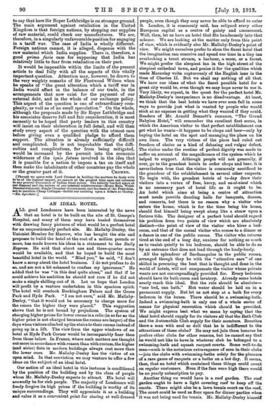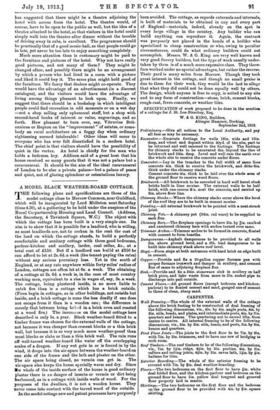AN IDEAL HOTEL.
ALL good Londoners have been interested by the news that an hotel is to be built on the site of St. George's Hospital, and many of them may have busied themselves with drawing fancy pictures of what would be a perfect hotel for an unquestionably perfect site. Mr. Mallaby-Deeley, the Unionist Member for Harrow, who has bought the site and proposes to build the hotel at the cost of a million pounds or more, has made known his ideas in a statement to the Daily Express. He said that about one and three-quarter acres would be available, and that he hoped to build the most beautiful hotel in the world. " Mind you," he said, "I don't know a scrap about the hotel business. I do not profess to do BO, and am not a bit ashamed to confess my ignorance." He added that he was "in this deal quite alone," and that if he could achieve his ambition he should not care if he did not make a single shilling out of it. Let us hope that London will profit by a venture undertaken in this spacious spirit. The hotel will overlook Buckingham Palace and the Green Park and Hyde Park. "I am not sure," said Mr. Mallaby- Deeley, " that it would not be necessary to charge more for the rooms the higher they were placed." This suggestion shows that he is not bound by prejudices. The system of charging higher prices for lower rooms is a relic (in so far as the higher price is not charged because the rooms are larger) of the days when visitors climbed up the stairs to their rooms instead of going up in a lift. The view from the upper windows of an hotel at Hyde Park Corner would be incomparably finer than from those below. In France, where such matters are thought out more in accordance with reason than with custom, the higher (and airier) flats in modern buildings always cost more than the lower ones. Mr. Mallaby-lleeley has the virtue of an open mind. In that conviction we may venture to offer a few ideas on the subject of an ideal hotel.
Our notion of an ideal hotel in this instance is conditioned by the position of the building and by the class of people whom Mr. Mallaby-Deeley expects to attract. His hotel will avowedly be for rich people. The majority of Londoners will freely forgive its high prices if the building is worthy of its unique surroundings. They will appreciate it as a building and value it as a convenient point for staring at well-dressed
people, even though they may never be able to afford to enter it. London, it is commonly said, has eclipsed every other European capital as a centre of gaiety and amusement. Well, then, let us have an hotel that fits handsomely into that scheme. We are looking at the matter only from this point of view, which is evidently also Mr. Mullaby-Deeley's point of view. We might ourselves prefer to shun the finest hotel that the imagination can conceive and spend our time in a tiny inn overlooking a trout stream, a harbour, a moor, or a forest. We might prefer the sleepiest inn in the high street of the sleepiest cathedral town, and praise it for the qualities which made Macaulay write rapturously of the English inns iu the time of Charles II. But we shall say nothing of all that. We have our ideas of what the finest possible hotel for a great city would be, even though we may hope never to use it. Very likely, we repeat, in the quest for the perfect hotel Mr. Mallaby-Deeley's inexperience is no disadvantage. At least, we think that the best hotels we have ever seen fail in some ways to provide just what is wanted by people who would stick at no expense in getting what they wanted if they could. Readers of Mr. Arnold Bennett's romance, "The Grand Babylon Hotel," will remember the excellent first scene, in which the American visitor to that perfect establishment can get what he wants—it happens to be chops and beer—only by buying the hotel on the spot and managing the place on his own lines. The very virtues of the place had ruled out freedom of choice as a kind of debasing and vulgar defect. The visitor under the routine of perfect dignity was made to suffer on account of the magnificence of the system. which he helped to support. Although people will not generally, if ever, go to the grandest hotels to order chops and beer, it is nevertheless true that the visitor is commonly sacrificed to the grandeur of the establishment in several other respects. To begin with, the grandest hotels of to-day draw their visitors into a vortex of fuss, hurry, and va-et-vieat which is no necessary part of hotel life as it ought to be. An hotel which aims at being a centre of attraction must needs provide dazzling halls for banquets, dances, and concerts, but there is no reason why a visitor who enters the house, which is for the time being his home, should feel himself being swept along like a straw upon a furious tide. The designer of a perfect hotel should regard his problem from two points of view which are absolutely distinct—the point of view of the visitor who hires a bed- room, and that of the casual visitor who comes to a dinner or a dance in one of the public rooms. The visitor who returns tired at the end of a long day, anxious for nothing so much as to vanish quietly to his bedroom, should be able to do so by an entrance that does not lead through the hurly-burly.
All the splendour of Sardanapalus in the public rooms, arranged though they be with the " attentive ears" of one skilled in procuring the best that is thought and done in the world of hotels, will not compensate the visitor whose private wants are not correspondingly provided for. Every bedroom. should have its bath-room and lavatory. Already some hotels nearly reach this ideal. But the rule should be absolute- " one bed, one bath." Hot water should be laid on in a permanent supply. But let us not atop at a bath for every bedroom in the house. There should be a swimming-bath. Indeed a swimming-bath is only one of a whole series of means for physical recreation which should be provided. We might express best what we mean by saying that the ideal hotel should supply for its visitors all that the Bath Club and the Automobile Club supply for their members. Breathes there a man with soul so dull that he is indifferent to the attractions of these clubs? He may not join them because he prefers other clubs for other reasons, but he cannot say that he would not like to have in whatever club he belonged to a swimming-bath and squash racquet courts. Some well-to-do men—such is the notorious extravagance of men in their clubs —join the clubs with swimming-baths solely for the pleasure of a rare game of racquets or a bathe on a hot day. It seems, then, that an hotel which contained these things could count on regular customers. Even if the fees were high there would be no yearly subscription to pay.
Another thing we would have is a roof garden. The roof garden ought to have a light covering roof to keep off the smuts. There might also be a lawn tennis court on the roof. The court could be used as floor space for dinner parties when it was not being used for tennis. Mr. Mallaby-Deeley himself has suggested that there might be a theatre adjoining the hotel with access from the hotel. The theatre would, of course, have to be open to the public as well, but the idea of a theatre attached to the hotel, so that visitors in the hotel could simply walk into the theatre after dinner without the trouble of driving away in cabs, is excellent. The programme should be practically that of a good music-hall, so that people could go in late, yet never be too late to enjoy something completely.
Much more attention than is customary might be paid to the furniture and pictures of the hotel. Why not have really good pictures, and not many of them ? They might be changed often, and possibly there might be an arrangement by which a person who had lived in a room with a picture and liked it could buy it. The same plan might hold good of the furniture. We fancy that dealers might co-operate. They would have the advantage of an advertisement (in a discreet catalogue), and the visitors would have the advantage of living among things pleasant to look upon. Finally, we suggest that there should be a bookshop in which intelligent people could find recreation in odd moments or on a wet day -not a shop selling only ephemeral stuff, but a shop with second-hand books of interest or value, engravings, and so forth. How pleasant to turn over, say, Vitruvius Brit- annicus or Repton on the "improvement" of estates, or some- body on rural architecture on a foggy day when ordinary sightseeing seemed intolerable! Other ideas will occur to everyone who has ever felt dissatisfied in a modem hotel. The chief point is that visitors should have the possibility of quiet in the vortex. An hotel is chiefly for the man who holds a bedroom key. Addison said of a great host that his house received so many guests that it was not a palace but a caravanserai. It should be the aim of the ideal caravanserai of London to be also a private palace-but a palace of peace and quiet, not of glaring splendour or ostentatious luxury.











































 Previous page
Previous page